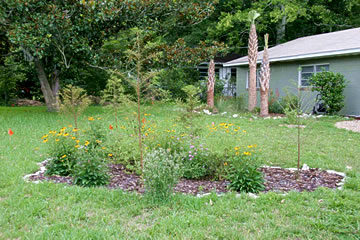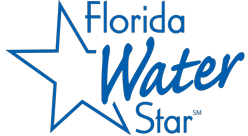Plant grouping
- Home
- /
- Technical Manual
- /
- Landscape criteria
- /
- Plant compatibility
- /
- Plant grouping
Background
When plants with dissimilar needs are installed within the same irrigation zone (hydrozone), overwatering and unsustainable maintenance practices can occur. Florida Water Star water-efficient practices are intended to result in landscapes with plants that are most appropriate for the site. These landscapes should only require minimal irrigation to survive.
Plants within the same irrigation zone, or hydrozone, should have similar moisture and maintenance needs.
Height/width: It is recommended that spacing compatibility be evaluated by using the Waterwise plant database. In most cases, plant spacing is compatible if a plant has enough space to grow to maturity, or plants should be spaced at least half their mature width from each other. Plant width should be considered in choosing plants adjacent to buildings, to minimize long-term maintenance. The landscape design may demand denser spacing for hedges or ground cover. Plant height is a particular consideration when choosing plants that will be installed adjacent to buildings.
Growth rate: The rate at which a plant grows under normal conditions, (i.e., slow, moderate, fast) is called the growth rate.
Soil moisture: All plants within a hydrozone must have similar soil moisture tolerances.

| Annual Growth Rate of Plants (in feet [ft]) | |||
|---|---|---|---|
| Plant Type | Slow | Medium | Fast |
| Trees | Less than 2 ft | 2 to 3 ft | More than 3 ft |
| Shrubs | Less than 2 ft | 2 to 3 ft | More than 3 ft |
| Perennials | Less than 1 foot | 1 foot | More than 1 foot |
| Fruit trees | Less than 2 ft | 2 to 3 ft | More than 3 ft |
| Fern | Less than 3 inches | 2 to 3 ft | More than 3 ft |
| Ground covers | Less than 1 foot | 1 to 2 ft | More than 2 ft |
| Vines | Less than 2 ft | 2 to 3 ft | More than 3 ft |
Requirements and certification
A minimum of 90% of plants are grouped by similar moisture and maintenance requirements.
| Silver | Gold | Commercial/Institutional |
|---|---|---|
| Required | Required | NA |
Plants are grouped by similar moisture and maintenance requirements.
| Silver | Gold | Commercial/Institutional |
|---|---|---|
| NA | NA | Required |
The Florida Water Star Inspector should use information in the design drawings and the Waterwise plant database to assess the compatibility of each landscape bed.
Confirmation of planted species and site conditions must occur on-site.
- Credit is awarded by calculating the percentage of compatible species as a percentage of the entire number of species. For example, if 90 of 100 species are compatible then 90% is achieved.
- Alternatively, the Inspector may award credit based on the total number of plants.
For Commercial/Institutional the landscape narrative may read as follows:
| Florida Water Star Commercial/Industrial Hydrozone Information and Narrative | |||||
| Hydrozone | Hardiness Zone | pH | Soil Moisture | Sun | Salinity |
| 1 | 9a | Neutral | Moist | Partial shade | NA |
| Type | Narrative Description | ||||
| Unirrigated turf grass | This hydrozone contains unirrigated Bahia turf grass. The grass should be established by receiving 0.75 inches of irrigation a week for 60 days. This zone will not require water after establishment. | ||||
| Irrigation | |||||
| None | |||||
